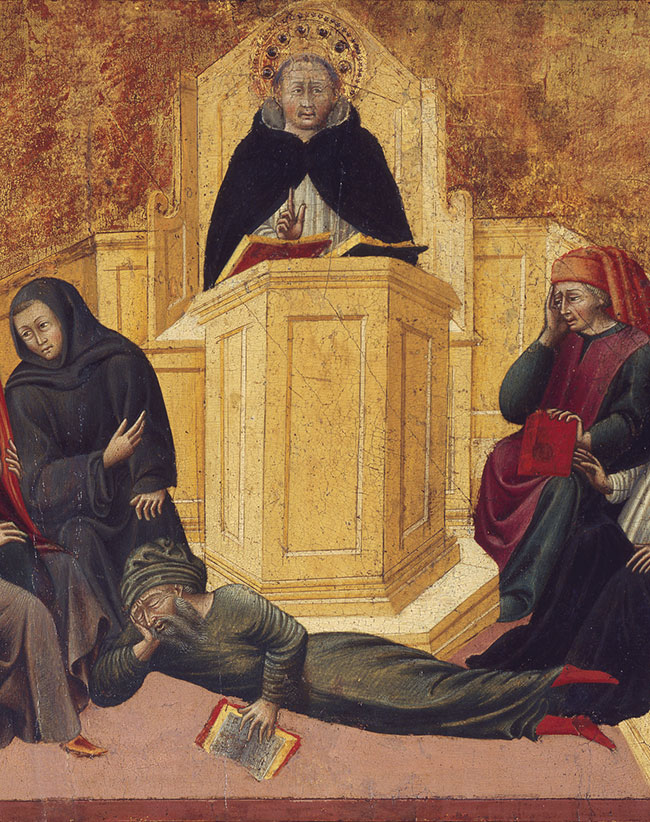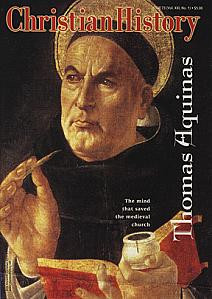THE BISHOP OF PARIS CONDEMNED ERRORS DERIVED FROM ARISTOTLE

[Above: Giovanni di Paolo (c.1399–1482), detail from Saint Thomas Aquinas Confounding Averroës—Saint Louis Art Museum. public domain]
IN THE ELEVENTH AND TWELFTH CENTURIES, sparks flew when new ideas met old. The Latin-speaking Christian world had begun to recover and translate long-lost Greek texts of Aristotle and other philosophers. Some of these texts had reached the West through the commentaries of the Islamic scholar Averroes.
Although Aristotle had taught many things contrary to Christian doctrine, William of Auvergne endeavored to synthesize Aristotelian philosophy with Christian theology. Other theologians who joined this trend were Albertus Magnus and Thomas Aquinas. While this pair remained orthodox, some thinkers at Christian schools adopted the ideas of Aristotle and Averroes to the detriment of Christian teaching. Siger of Brabant, for instance, taught that while philosophy and logic (following Aristotle) could reach necessary conclusions, theological truth (following the Bible and church dogma) might require a different answer. In other words, truth was not an integrated whole.
Aristotle and Averroes taught the eternality of the cosmos, denied God’s providence, and set philosophy above faith and Scripture. Furthermore, Averroes taught the unity of intellect, that all humans share a single intellect outside themselves which they tap into when they think. By the middle of the thirteenth century, theologians such as the Franciscan leader Bonaventure were warning against Aristotelian and Averroist errors.
The University of Paris was the preeminent Christian university in Western Europe. When its faculty delivered a judgment, the decision carried weight. Kings and popes consulted it on theological questions. Several of its professors were tinged with Aristotelian error. If its theologians adopted heretical philosophies, they could propagate non-Christian conclusions.
On this day, 10 December 1270, the bishop of Paris, Étienne Tempier, condemned thirteen propositions derived from Aristotle and Averroes. Tempier knew the school’s tendencies well, having been Chancellor of the Sorbonne (the fledgling University of Paris).
Apparently his condemnations did not have much effect. In 1276, Pope John XXI complained of false teaching at the school. Pushed into action again, Tempier condemned over two hundred propositions the following year. Among the newly added condemnations were prohibitions against astrological determinism (the stars could not usurp God’s providential dealings with humans.) Nor could Aristotelian thinking limit what God can do (anything that does not contradict his nature and utterances). Although a few of Aquinas’s statements may have fallen under Tempier’s condemnations, Aquinas wrote in refutation of Averroes, especially with regard to the unity of intellect, and is often depicted as triumphing over the Muslim philosopher.
Tempier’s approach has generated much dispute. Was it good or bad for science? While it limited some speculations, it freed theologians to consider other possibilities that strict Aristotelianism would have vetoed. For example, theologians could speculate whether God created universes beside our own and whether or not God can do things that violate the laws of the universe, such as move an object through space in a straight line rather than along a curve.
—Dan Graves
-----
These events took place in the age of Aquinas. For more background, see Christian History #Issue 73, Thomas Aquinas
For more on Christianity and science, see Christian History #76 The Christian face of the scientific revolution and Christian History #134 How the church fostered science and technology.






